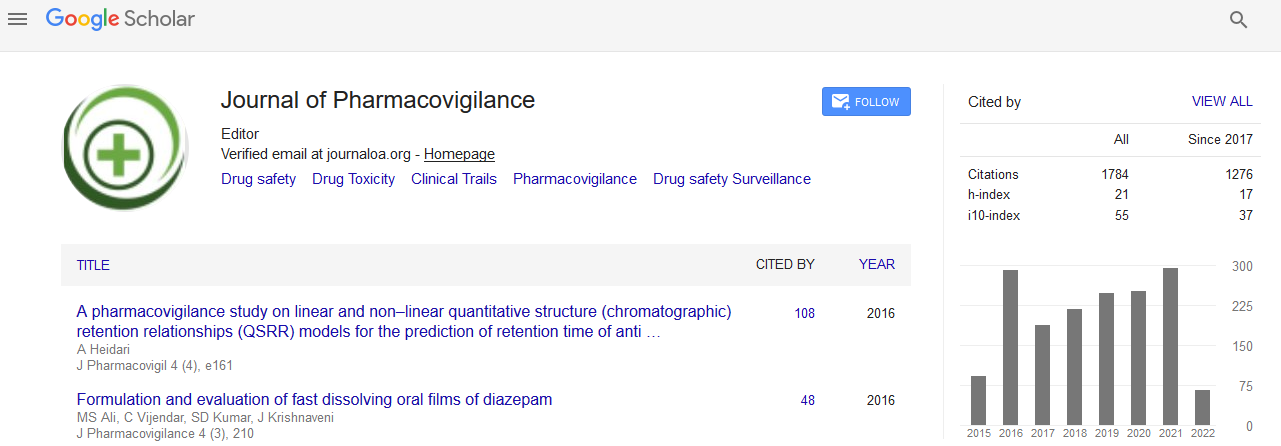Indexed In
- Open J Gate
- JournalTOCs
- The Global Impact Factor (GIF)
- RefSeek
- Hamdard University
- EBSCO A-Z
- OCLC- WorldCat
- Publons
- Euro Pub
- Google Scholar
Useful Links
Share This Page
Journal Flyer

Open Access Journals
- Agri and Aquaculture
- Biochemistry
- Bioinformatics & Systems Biology
- Business & Management
- Chemistry
- Clinical Sciences
- Engineering
- Food & Nutrition
- General Science
- Genetics & Molecular Biology
- Immunology & Microbiology
- Medical Sciences
- Neuroscience & Psychology
- Nursing & Health Care
- Pharmaceutical Sciences
Update on cardiotoxicity and safety of Domperidone for treating nausea and vomiting
6th Pharmacovigilance Congress
September 28-30, 2016 Toronto, Canada
Richard W. McCallum
Texas Tech University Health Sciences Center, El Paso, Texas
Posters & Accepted Abstracts: J Pharmacovigil
Abstract:
Background: Domperidone, a dopamine receptor antagonist, acts peripherally as a gastrointestinal prokinetic and centrally as an anti-emetic. A safety concern in regards to domperidone is whether it can cause ventricular arrhythmia and sudden cardiac death. Objectives: This systematic review has been designed to address whether there is any possible association between domperidone and serious cardiac events such as ventricular arrhythmia or sudden cardiac death. Data sources, study eligibility criteria & participants: PubMed was searched for case-control studies on the cardiotoxicity associated with domperidone. Moreover, clinical studies on the effects of domperidone in patients with gastroparesis were reviewed for any cardiac adverse events. Study appraisal and synthesis methods: Seven case-control studies and 7 interventional studies were retrieved. The quality of casecontrol studies were tested by the Newcastle-Ottawa Scale (NOS) based on its 3 major criteria, i.e. selection, comparability and exposure, where good quality research is defined as �?� 3 points for the selection domain, �?� 2 points for the comparability domain and �?� 2 points for the exposure domain. The odds of domperidone on outcome were assessed. Random and fixed effect models were used based on I2 value. The rate of cardiac events in interventional studies was also determined. Findings: Most of the included case-control studies were graded fair or poor based on NOS, although mathematically domperidone was a significant risk for cardiac events (unadjusted Odds ratio: 1.88 and adjusted Odds ratio 1.60; P<0.05). Serious cardiac adverse effects were not reported in the patients with gastroparesis using domperidone at the dosage range of 30-120mg (majority �?�80 mg) daily for up to 48 months. In the most recent study, 64 patients were receiving domperidone (40 to 120 mg daily) for various time intervals from 3 months to 4 years; 52 for gastroparesis and 8 for chronic nausea and vomiting. Approximately 73% of the patients had a clinically meaningful response to domperidone and there were no serious side effect. Only 3 of the 64 patients chronically receiving high doses of domperidone reported palpitations but without any complaints of chest pain or accompanying QTc prolongation or cardiac dysrhythmias. Limitations: As mentioned, the quality of most of the included case-control studies was of fair or poor grading. Some of the included studies in meta-analysis had low prevalence of patients exposed to domperidone. This may provide biased effect size. Conclusions and implications of key findings: Due to the low quality of case-control studies on the cardiotoxicity of domperidone, the possible association between this medication and cardiac events is still under debate. Although, this association is not adequately clear, we should be cautious when prescribing this medication. Well-planned prospective studies should explore the long-term adverse effects of domperidone.
Biography :
Email: richard.mccallum@ttuhsc.edu


